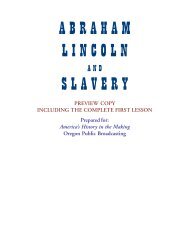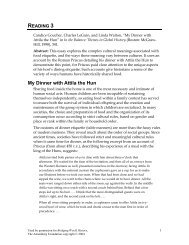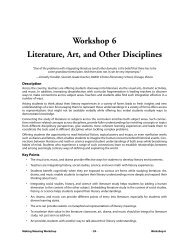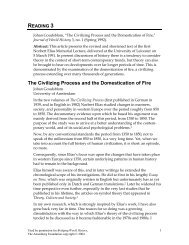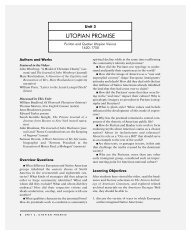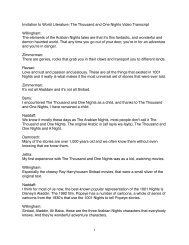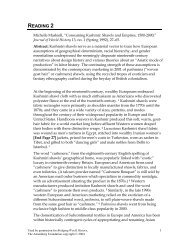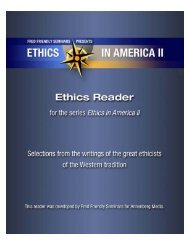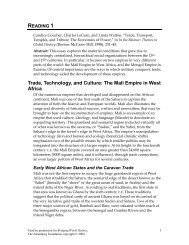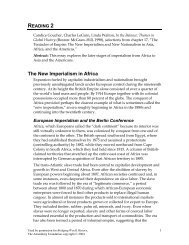Download Unit 8 Readings, Bureaucracy: A Controversial Necessity
Download Unit 8 Readings, Bureaucracy: A Controversial Necessity
Download Unit 8 Readings, Bureaucracy: A Controversial Necessity
Create successful ePaper yourself
Turn your PDF publications into a flip-book with our unique Google optimized e-Paper software.
Humphrey’s Executor v. U.S.<br />
In Humphrey’s Executor v. <strong>Unit</strong>ed States, 295 U.S. 602 (1935) the Supreme Court limited the reach of Myers v. U.S.<br />
The Supreme Court distinguished between the type of governmental office, suggesting that the president had full<br />
control over the officers within purely executive offices but not in positions that “cannot in any proper sense be<br />
characterized as an arm or an eye of the executive.” The Court upheld the Federal Trade Commission Act claiming<br />
that in light of the function of the agency Congress could control the president’s removal power.<br />
HUMPHREY’S EXECUTOR v. UNITED STATES, 295 U.S. 602 (1935)<br />
SUTHERLAND, J., Opinion of the Court<br />
MR. JUSTICE SUTHERLAND delivered the opinion of the Court.<br />
Plaintiff brought suit in the Court of Claims against the <strong>Unit</strong>ed States to recover a sum of money alleged to be due<br />
the deceased for salary as a Federal Trade Commissioner from October 8, 1933, when the President undertook to<br />
remove him from office, to the time of his death on February 14, 1934. The court below has certified to this court<br />
two questions (Act of February 13, 1925, § 3(a), c. 229, 43 Stat. 936, 939; 28 U.S.C. § 288) in respect of the power of<br />
the President to make the removal. The material facts which give rise to the questions are as follows:<br />
William E. Humphrey, the decedent, on December 10, 1931, was nominated by President Hoover to succeed himself<br />
as a member of the Federal Trade Commission, and was confirmed by the <strong>Unit</strong>ed States Senate. He was duly<br />
commissioned for a term of seven years expiring September 25, 1938; and, after taking the required oath of office,<br />
entered upon his duties. On July 25, 1933, President Roosevelt addressed a letter to the commissioner asking for<br />
his resignation, on the ground that the aims and purposes of the Administration with respect to the work of the<br />
Commission can be carried out most effectively with personnel of my own selection, but disclaiming any reflection<br />
upon the commissioner personally or upon his services. The commissioner replied, asking time to consult<br />
[p*619] his friends. After some further correspondence upon the subject, the President, on August 31, 1933, wrote<br />
the commissioner expressing the hope that the resignation would be forthcoming, and saying:<br />
You will, I know, realize that I do not feel that your mind and my mind go along together on either the policies or<br />
the administering of the Federal Trade Commission, and, frankly, I think it is best for the people of this country that<br />
I should have a full confidence.<br />
The commissioner declined to resign, and on October 7, 1933, the President wrote him:<br />
Effective as of this date, you are hereby removed from the office of Commissioner of the Federal Trade<br />
Commission.<br />
Humphrey never acquiesced in this action, but continued thereafter to insist that he was still a member of the<br />
commission, entitled to perform its duties and receive the compensation provided by law at the rate of $10,000<br />
per annum. Upon these and other facts set forth in the certificate, which we deem it unnecessary to recite, the following<br />
questions are certified:<br />
1. Do the provisions of section 1 of the Federal Trade Commission Act, stating that “any commissioner may be<br />
removed by the President for inefficiency, neglect of duly, or malfeasance in office,” restrict or limit the power of<br />
the President to remove a commissioner except upon one or more of the causes named?<br />
If the foregoing question is answered in the affirmative, then—<br />
2. If the power of the President to remove a commissioner is restricted or limited as shown by the foregoing interrogatory<br />
and the answer made thereto, is such a restriction or limitation valid under the Constitution of the <strong>Unit</strong>ed<br />
States?<br />
The Federal Trade Commission Act, c. 311, 38 Stat. 717; 15 U.S.C. §§ 41, 42, creates a commission of five [p*620]<br />
members to be appointed by the President by and with the advice and consent of the Senate, and § 1 provides:<br />
Not more than three of the commissioners shall be members of the same political party. The first commissioners<br />
appointed shall continue in office for terms of three, four, five, six, and seven years, respectively, from the date of<br />
the taking effect of this Act, the term of each to be designated by the President, but their successors shall be<br />
<strong>Unit</strong> 8 - 212 - Democracy in America





